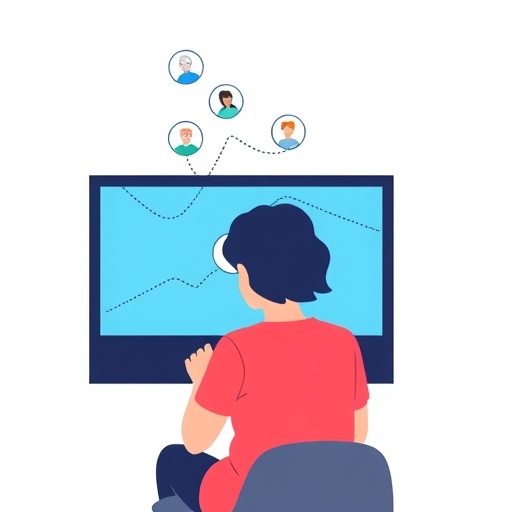In the realm of gerontology, the social dynamics surrounding aging populations are complex and multifaceted. Recent research conducted by Li et al. has brought to light some critical insights into the psychological and social factors influencing older adults, specifically within the context of China. Their study focuses on the relationship between self-aging attitudes and social isolation, bridging the gap with the influences of internet self-efficacy and active social media usage. As modern technological advancements continue to permeate daily life, understanding their impact on older generations becomes increasingly vital.
At the core of their investigation lies the concept of self-aging attitudes. This refers to the perceptions and beliefs individuals hold regarding the aging process, which can significantly affect their psychological well-being. Positive self-aging attitudes are generally associated with optimism and resilience in older adults, enabling them to adapt more effectively to the changes that accompany aging. Conversely, negative beliefs about aging can lead to feelings of inadequacy and isolation, potentially exacerbating mental health issues.
The study by Li and colleagues emphasizes the alarming prevalence of social isolation among older adults in China, a phenomenon that has critical implications for public health policy. Social isolation can stem from various factors, such as the loss of family members, retirement, and limited mobility. With social bonds weakening, many older individuals may find themselves living in silence, cut off from vital social interactions and emotional support systems. This state of isolation not only hampers mental health but can also enhance the risk of developing chronic illnesses.
In a society increasingly oriented towards digital connectivity, the role of the internet cannot be understated. Internet self-efficacy, defined as an individual’s confidence in using the internet, becomes an essential factor when addressing social isolation. Those who possess higher levels of internet self-efficacy are more likely to engage with digital platforms, making them effective tools for socialization. As older adults develop their digital skills, they may find new ways to maintain connections with friends and family, ultimately countering feelings of loneliness and despair.
Moreover, the use of social media represents a significant avenue for combating social isolation. By actively participating in online communities, older adults can foster relationships, access support networks, and share their experiences with others in similar situations. The research findings indicate a positive correlation between active social media use and decreased feelings of isolation, suggesting that encouraging older adults to embrace these platforms may provide an effective remedy for their social challenges.
While the advantages of being connected through the internet and social media are becoming clearer, the researchers also identified potential barriers to this connectivity. Issues such as lack of access to technology, varying levels of digital literacy, and even apprehension towards adoption linked with age can hinder older adults from fully benefitting from online social interactions. Addressing these challenges is crucial for policymakers and community leaders, who must devise strategies to support older individuals in becoming adept at navigating digital landscapes.
With the mediation of internet self-efficacy and active social media use, the study underscores an important narrative: older adults can reshape their aging experience by tapping into modern technology. It presents a paradigm shift in how society perceives aging, from a phase characterized by decline to one that embraces growth, community engagement, and continued learning. Through the lens of Li et al.’s findings, it becomes evident that empowering older adults with skills and confidence in technology can lead to a more fulfilling and integrated lifestyle.
Furthermore, the implications of these findings extend beyond individual well-being. Enhancing the social lives of older individuals may also lead to broader societal benefits, including reduced healthcare costs associated with loneliness and its related health issues. Engaged and fulfilled older adults are less likely to require extensive medical care, ultimately benefiting society as a whole.
In conclusion, the research conducted by Li, Niu, and Yuan significantly contributes to our understanding of the relationship between aging, technology, and social well-being. It highlights the importance of adopting positive attitudes towards aging and harnessing the power of technology to build social connections. As we continue to evolve in an increasingly digital age, fostering an environment where older adults can thrive is essential. Encouraging digital literacy and creating supportive communities not only addresses the pressing issues of social isolation but also redefines what it means to age in today’s world.
A call to action emerges from this research: for stakeholders across various sectors, from healthcare professionals to community organizations, to recognize and leverage the potential of technology in enriching the lives of older adults. By advocating for enhanced access to technology and promoting digital engagement, we can contribute to a future where aging is not synonymous with solitude but rather with connection, empowerment, and vibrant living.
Empowering our elders through technology-driven socialization is not just a personal benefit; it’s a societal imperative that requires collective action and empathy. With sustained efforts, we can pave the way for transformative change in the social landscape of aging, leading to healthier and happier lives for older generations.
Subject of Research: Self-aging attitudes and social isolation among older adults in China
Article Title: Self-aging Attitudes and Social Isolation Among Chinese Older Adults: The Mediating Roles of Internet Self-efficacy and Active Social Media Use
Article References:
Li, K., Niu, G., Yuan, Z. et al. Self-aging Attitudes and Social Isolation Among Chinese Older Adults: The Mediating Roles of Internet Self-efficacy and Active Social Media Use.
J Adult Dev (2025). https://doi.org/10.1007/s10804-025-09538-6
Image Credits: AI Generated
DOI: 10.1007/s10804-025-09538-6
Keywords: aging, social isolation, internet self-efficacy, social media, older adults, China, gerontology, technology, mental health.




